【英语】情态动词练习题含答案
【英语】情态动词练习题含答案及解析
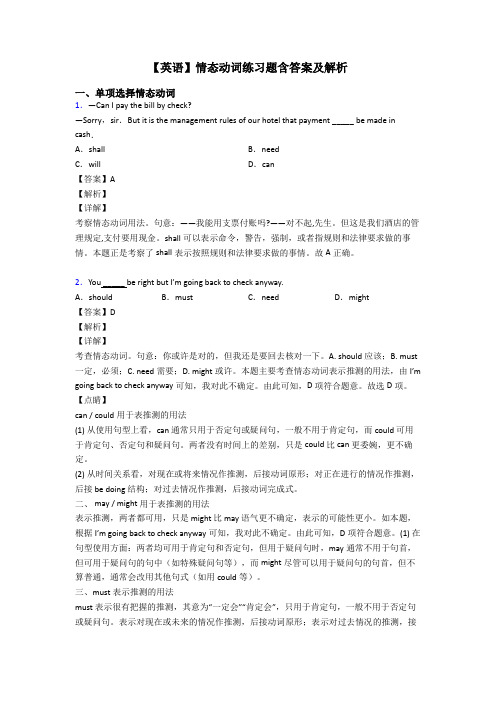
【英语】情态动词练习题含答案及解析一、单项选择情态动词1.—Can I pay the bill by check?—Sorry,sir.But it is the management rules of our hotel that payment _____ be made in cash.A.shall B.needC.will D.can【答案】A【解析】【详解】考察情态动词用法。
句意:——我能用支票付账吗?——对不起,先生。
但这是我们酒店的管理规定,支付要用现金。
shall可以表示命令,警告,强制,或者指规则和法律要求做的事情。
本题正是考察了shall表示按照规则和法律要求做的事情。
故A正确。
2.You _____ be right but I’m going back to check anyway.A.should B.must C.need D.might【答案】D【解析】【详解】考查情态动词。
句意:你或许是对的,但我还是要回去核对一下。
A. should应该;B. must 一定,必须;C. need需要;D. might或许。
本题主要考查情态动词表示推测的用法,由I’m going back to check anyway可知,我对此不确定。
由此可知,D项符合题意。
故选D项。
【点睛】can / could用于表推测的用法(1) 从使用句型上看,can 通常只用于否定句或疑问句,一般不用于肯定句,而could 可用于肯定句、否定句和疑问句。
两者没有时间上的差别,只是could 比 can 更委婉,更不确定。
(2) 从时间关系看,对现在或将来情况作推测,后接动词原形;对正在进行的情况作推测,后接 be doing 结构;对过去情况作推测,后接动词完成式。
二、 may / might用于表推测的用法表示推测,两者都可用,只是 might 比 may 语气更不确定,表示的可能性更小。
初二情态动词练习题及答案

初二情态动词练习题及答案一、选择题1. – _______ I go to the party tonight?– No, you _______. You have to finish your homework.A. Can; mustn'tB. May; mustC. Can; can'tD. May; can't2. Tom _______ swim when he was 5 years old.A. couldB. canC. mayD. might3. – _______ I borrow your pencil?– Of course you _______.A. Can; mayB. May; canC. Could; couldD. Might; can4. We _______ see the stars very clearly in the city because there is too much light pollution.A. mustB. can'tC. may notD. don't have to5. _______ I watch TV before I finish my homework?A. MustB. WillC. Can'tD. Should二、填空题1. You _______ finish your vegetables if you want dessert.2. _______ we go to the beach tomorrow if it doesn't rain?3. I'm not sure if I _______ make it to the party tonight. I might have another appointment.4. He _______ have been tired after running for three hours.5. – _______ I join the school band?– Absolutely! You have a great voice.三、改错题1. I musted finish my homework before I could go out and play.2. May I borrow your pen? – Certainly. You can borrowing it.3. She cannot to come to the party because she has a piano lesson.4. You should to take an umbrella with you. It might rain later.5. He shouldn't not eat too much junk food. It's bad for his health.四、翻译题1. 你可以帮我一下吗?2. 我可以去朋友家玩吗?3. 我们应该如何处理这个问题?4. 你可以告诉我作业的答案吗?5. 他可能会迟到。
初中英语情态动词练习
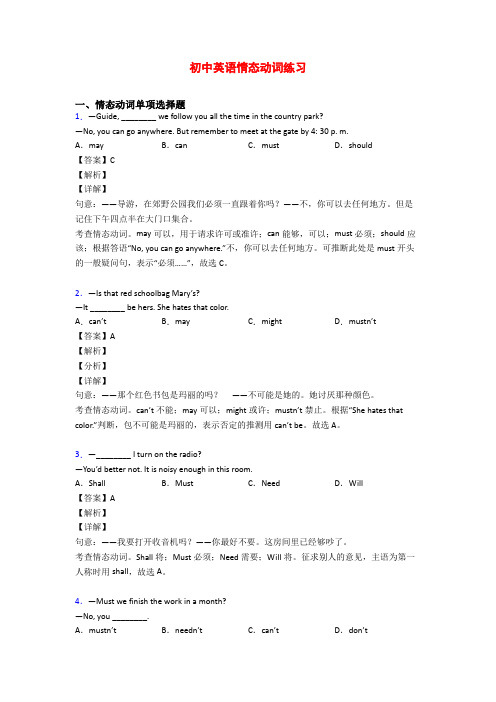
初中英语情态动词练习一、情态动词单项选择题1.—Guide, ________ we follow you all the time in the country park?—No, you can go anywhere. But remember to meet at the gate by 4: 30 p. m.A.may B.can C.must D.should【答案】C【解析】【详解】句意:——导游,在郊野公园我们必须一直跟着你吗?——不,你可以去任何地方。
但是记住下午四点半在大门口集合。
考查情态动词。
may可以,用于请求许可或准许;can能够,可以;must必须;should应该;根据答语“No, you can go anywhere.”不,你可以去任何地方。
可推断此处是must开头的一般疑问句,表示“必须……”,故选C。
2.—Is that red schoolbag Mary’s?—It ________ be hers. She hates that color.A.can’t B.may C.might D.mustn’t【答案】A【解析】【分析】【详解】句意:——那个红色书包是玛丽的吗?——不可能是她的。
她讨厌那种颜色。
考查情态动词。
can’t不能;may可以;might或许;mustn’t禁止。
根据“She hates that color.”判断,包不可能是玛丽的,表示否定的推测用can’t be。
故选A。
3.—________ I turn on the radio?—You’d better not. It is noisy enough in this room.A.Shall B.Must C.Need D.Will【答案】A【解析】【详解】句意:——我要打开收音机吗?——你最好不要。
这房间里已经够吵了。
考查情态动词。
Shall将;Must必须;Need需要;Will将。
【英语】情态动词(完整版)
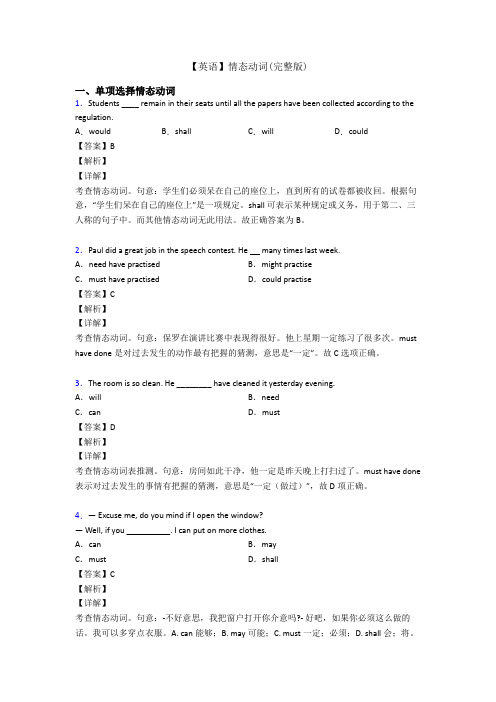
【英语】情态动词(完整版)一、单项选择情态动词1.Students ____ remain in their seats until all the papers have been collected according to the regulation.A.would B.shall C.will D.could【答案】B【解析】【详解】考查情态动词。
句意:学生们必须呆在自己的座位上,直到所有的试卷都被收回。
根据句意,“学生们呆在自己的座位上”是一项规定。
shall 可表示某种规定或义务,用于第二、三人称的句子中。
而其他情态动词无此用法。
故正确答案为B。
2.Paul did a great job in the speech contest. He many times last week.A.need have practised B.might practiseC.must have practised D.could practise【答案】C【解析】【详解】考查情态动词。
句意:保罗在演讲比赛中表现得很好。
他上星期一定练习了很多次。
must have done是对过去发生的动作最有把握的猜测,意思是“一定”。
故C选项正确。
3.The room is so clean. He ________ have cleaned it yesterday evening.A.will B.needC.can D.must【答案】D【解析】【详解】考查情态动词表推测。
句意:房间如此干净,他一定是昨天晚上打扫过了。
must have done 表示对过去发生的事情有把握的猜测,意思是“一定(做过)”,故D项正确。
4.— Excuse me, do you mind if I open the window?— Well, if you __________. I can put on more clothes.A.can B.mayC.must D.shall【答案】C【解析】【详解】考查情态动词。
(完整版)情态动词专项练习(含答案)
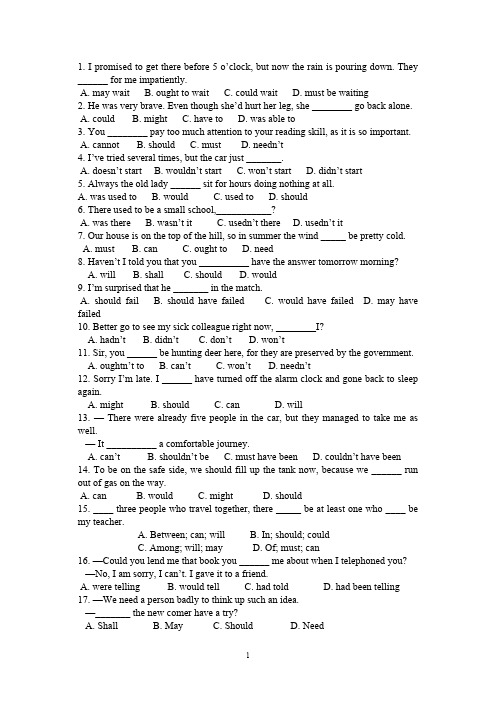
1. I promised to get there before 5 o’clock, but now the rain is pouring down. They ______ for me impatiently.A. may waitB. ought to waitC. could waitD. must be waiting2. He was very brave. Even though she’d hurt her leg, she ________ go back alone.A. couldB. mightC. have toD. was able to3. You ________ pay too much attention to your reading skill, as it is so important.A. cannotB. shouldC. mustD. needn’t4. I’ve tried several times, but the car just _______.A. doesn’t startB. wouldn’t startC. won’t startD. didn’t start5. Always the old lady ______ sit for hours doing nothing at all.A. was used toB. wouldC. used toD. should6. There used to be a small school,___________?A. was thereB. wasn’t itC. usedn’t thereD. usedn’t it7. Our house is on the top of the hill, so in summer the wind _____ be pretty cold.A. mustB. canC. ought toD. need8. Haven’t I told you that you __________ have the answer tomorrow morning?A. willB. shallC. shouldD. would9. I’m surprised that he _______ in the match.A. should failB. should have failedC. would have failedD. may have failed10. Better go to see my sick colleague right now, ________I?A. hadn’tB. didn’tC. don’tD. won’t11. Sir, you ______ be hunting deer here, for they are preserved by the government.A. oughtn’t toB. can’tC. won’tD. needn’t12. Sorry I’m late. I ______ have turned off the alarm clock and gone back to sleep again.A. mightB. shouldC. canD. will13. — There were already five people in the car, but they managed to take me as well.— It __________ a comfortable journey.A. can’tB. shouldn’t beC. must have beenD. couldn’t have been14. To be on the safe side, we should fill up the tank now, because we ______ run out of gas on the way.A. canB. wouldC. mightD. should15. ____ three people who travel together, there _____ be at least one who ____ be my teacher.A. Between; can; willB. In; should; couldC. Among; will; mayD. Of; must; can16. —Could you lend me that book you ______ me about when I telephoned you?—No, I am sorry, I can’t. I gave it to a friend.A. were tellingB. would tellC. had toldD. had been telling17. —We need a person badly to think up such an idea.—_______ the new comer have a try?A. ShallB. MayC. ShouldD. Need18. We ________ so tired. We’ve only been to a party.A. mustn’t have feltB. wouldn’t have feltC. shouldn’t have feltD. couldn’t have felt19. Professor Smith, many students want to see you. __________ they wait here or outside?A. DoB. ShallC. WillD. Would20. —How about paying a visit to Mr. Richardson, our former history teacher?—Good idea. I will e-mail him today so he _____know _________ to expect us.A. shall; whyB. may; whenC. would; whyD. will; how21. —I went to work on foot yesterday, though it _________ cats and dogs.—You __________ by bus. It was likely to get a cold.A. is raining; must have goneB. rained; would goC. was mining; should have goneD. have rained; could have gone22. You ______ pay too much attention to your reading skill, as it is so important.A. cannotB. shouldC. mustD. needn’t23. I told Sally to fix him up with this job, but perhaps I _________ it out for her.A. had to writeB. must have writtenC. should have writtenD. ought to write24. My sister met him at the Grand Theatre yesterday afternoon, so he ________ your lecture.A. couldn’t have attendedB. needn’t have attendedC. mustn’t have attendedD. shouldn’t have attended25. Research findings show we spend about two hours dreaming every night, no matter what we ________ during the day.A. should have doneB. would have doneC. may have doneD. must have done26. —Is there any flight to Tokyo today?— I think there _____, for the weather is too bad.A. mustn’t beB. mightn’t beC. needn’t beD. can’t be27. —I’m told that John had another car accident this morning.— I believe not. He _____ so careless.A. shouldn’t have beenB. wouldn’t have beenC. couldn’t have beenD. mustn’t have been28. It was playing computer games that cost the boy a lot of time that he __________ doing his lessons.A. might have spentB. ought to have spentC. must have spentD. could have spent29. —I didn’t know you were good friends.—You _______. I have known her since she moved here. You were studying abroad then.A. may haveB. needn’t haveC. couldn’t haveD. must have30. They must have finished the work by the end of last month, __________?A. mustn’t theyB. haven’t theyC. hadn’t theyD. didn’t they31. —I didn’t see her yesterday.— Of course, you _____, because he had gone for a trip.A. can’tB. may not haveC. can’t haveD. mustn’t have32. You ________ phone him if you want to, but you _________. He is sure to phone you.A. may; mustn’tB. have to; needn’tC. can; doesn’t needD. can; needn’t33. — She must have gone back to the valley.— ______, she _____ have. The entrance to it was nowhere to be found.A. No; mustn’tB. Yes; mightC. Yes; couldD. No; couldn’t34. He _____ full marks, but he was so careless as to make a spelling mistake.A. must have gainedB. can have gainedC. could have gainedD. must gain35. From what you said, she _____ you about it.A. mustn’t have toldB. can’t have toldC. mustn’t tellD. can’t tell36. — You ought to have made an apology to Tom yesterday evening.— Yes, I know I _________.A. ought toB. have toC. should haveD. must have37. —Is there a fog in the evening?—There _______ be. I’ll make a phone call to find it out.A. mustB. wouldC. willD. might38. — _______ he help you with the problem?—Well, though it is very hard, __________ I’ll do what I can to work it out.A. Shall; butB. Can; andC. Must; howeverD. Will; still39. —How is that, Joan?—Yeah, it’s from the boss. She _________ first, whether she likes it.A. shall goB. ought to have goneC. should goD. must have gone40. —Would you like to watch the video, in which you can see foreigners making jiaoji during the Spring Festival?—Sure, it ______ be very interesting.A. shouldB. mayC. canD. will41. —The door was open.—It _________ open. I had locked it myself and the key was in my pocket.A. can not beB. must not beC. can not have beenD. must not have been42. —Where ________ Margaret have put the empty bottles?—She ________ them away. They must be somewhere.A. can; can’t have thrownB. must; needn’tC. must; must have thrownD. cant; must throw43. —Mum, I climbed to get the Teddy Bear from the top of the shelf.—My goodness! You _______ yourself. You ______ do that next time.A. must have hurt; mustn’tB. should have hurt; can’tC. may have hurt; mustn’tD. might have hurt; won’t be able to44. —Shall I go and buy more food and drinks for the party?—No, we have prepared a fridge of those. That _______ be quite enough.A. canB. mayC. mightD. ought to45. —Hurry up, Michael! It’s ten to three.—Goodness me! The class_______. I’ll be late again.A. must beginB. may beginC. should have begunD. must have begun46. When he was there, he ____ go to that coffee shop at the street comer after work every day.A. wouldB. shouldC. had betterD. might47. —I hear you have written a novel.—Yes, the book ________ be out in a month or so.A. canB. dareC. shouldD. need48. —How could I thank you enough?—Don’t mention it. Any other man _________ that.A. must doB. could doC. would have doneD. should have done49. —Why aren’t they here yet?—They ________ the bus.A. can have missedB. must be late forC. may have missedD. might be late for50. Mike _______ come to see me I don’t want to go out in case he comes.A. canB. mustC. mayD. will51. The thief ________ in from the kitchen window as the door was closed.A. may climbB. must have climbedC. could have climbedD. should have climbed52. —You didn’t invite Bill?— __________ him too?A. Must I inviteB. Must I have invitedC. Should I inviteD. Should I have invited53. —Why didn’t you attend the lecture yesterday?—I didn’t think that we _______ on Sundays.A. shouldB. ought to haveC. shouldn’t haveD. will have to54. It’s said that there are plenty of hotels in that town. There ______ be any difficulty for you to find somewhere to stay.A. wouldn’tB. mustn’tC. shouldn’tD. needn’t55. —Would you be here to attend the English party this evening?—Yes, we _________.A. shallB. wouldC. willD. must56. On Sundays when I was a child, Father and I _______ get up early and go fishing.A. couldB. wouldC. mightD. should57. —You’d better keep quiet in class.—Sometimes I ________ Yesterday, I was very quiet during my English class.A. wouldB. doC. didD. have58. I lived with my sister this summer and didn’t have to pay rent. So I ______ save most of my salary.A. couldB. wouldC. was able toD. should59. —Look, John’s fallen asleep.— Oh, he _______ too late last night.A. might sit upB. should have sat upC. could sit upD. must have sat up60. —I posted the letter a week ago.—Then they __________ the letter by now. It usually takes four days.A. can have receivedB. must receiveC. should receiveD. ought to have received61. He used to teach in that university and I _________ ride past it on my way to work.A. wouldB. couldC. shouldD. might62. —So you have to leave now.—Yes, I __________.—How nice it would be if you could stay a bit longer!A. have toB. ought toC. doD. have63. He _______ Shanghai, for I saw him talking with the headmaster a moment ago.A. must have gone toB. can’t have gone toC. mustn’t have been toD. can’t have been to64. From what I learn about their hotel, the service and the weather, they _____ their holiday very much.A. wouldn’t have enjoyedB. shouldn’t have enjoyedC. needn’t have enjoyedD. can’t have enjoyed65. It is not like Jack to be unfriendly, so he _________ you when you called.A. can’t have seenB. should not have seenC. must not have seenD. need not have seen66. —Many people in England love to give advice on weather reporting.—Yes, but I think the weather office’s computers _________ be more accurate.A. canB. mustC. ought toD. might67. —The farmers lived near the high way.—________ very noisy.A. It must have beenB. They must beC. That might beD. There must be68. She is too slow. She ________ pass the test, but she __________ too little.A. would; knewB. will; knowsC. would; knowsD. will; knew69. —Mary didn’t turn up last time, did she?—No. She_________. We had changed our plan.A. shouldn’t have comeB. needn’t have to comeC. didn’t need to comeD. needn’t have come70. —They haven’t finished the work up to now.—Well, they________.A. shouldB. should haveC. wouldD. must have71. —Shall I go and buy more fruit for the party?—No, I have already bought 3 baskets. That _________ be enough.A. canB. ought toC. mayD. might72. —Why hasn’t the speaker turned up?—He _________ the flight. I’ll find it out at once.A. must have missedB. might have missedC. would have missedD. could have missed73. I _______ pay Tom a visit, but I am not sure whether I will have time this Sunday.A. shouldB. mightC. wouldD. could74. —Who is the girl standing over there?— Well, if you _____ know, her name is Mabel.A. mayB. canC. mustD. shall75. It has been announced that candidates (考生)________ remain in their seats until all the papers have been collected.A. canB. willC. mayD. shall【答案解析】1.D。
情态动词练习题带答案
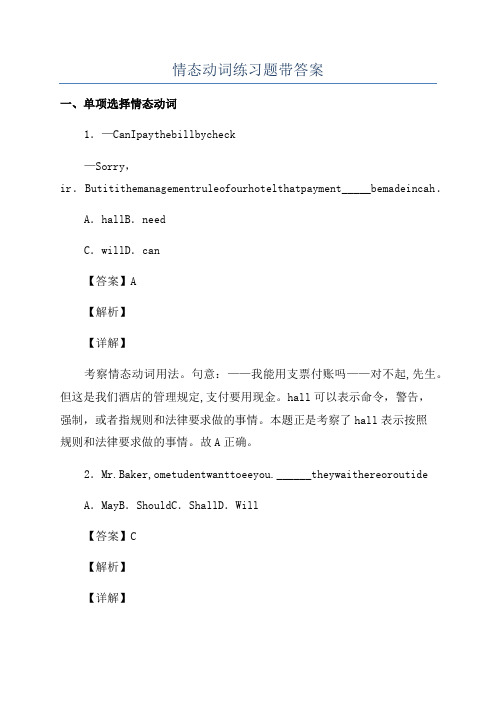
情态动词练习题带答案一、单项选择情态动词1.—CanIpaythebillbycheck—Sorry,ir.Butitithemanagementruleofourhotelthatpayment_____bemadeincah.A.hallB.needC.willD.can【答案】A【解析】【详解】考察情态动词用法。
句意:——我能用支票付账吗——对不起,先生。
但这是我们酒店的管理规定,支付要用现金。
hall可以表示命令,警告,强制,或者指规则和法律要求做的事情。
本题正是考察了hall表示按照规则和法律要求做的事情。
故A正确。
2.Mr.Baker,ometudentwanttoeeyou.______theywaithereoroutideA.MayB.ShouldC.ShallD.Will【答案】C【解析】【详解】考查Shall的用法。
句意:贝克先生,有些学生想见你。
他们是在这里等还是在外面等Shall用于第一、第三人称疑问句中,表示说话人征求对方的意见或向对方请示。
故选C。
【点睛】Shall的用法Shall作为助动词,一般用于第一人称Ⅰ和We,表示一个将来的动作,构成将来时态。
Shall后面接动词原形。
例如:(1)IhallthinkitoverandLetyouknowmyidea.我将考虑一下此事,然后告诉你我的想法。
1.Shall用于第一人称,表示征求对方的意愿。
如:Whathallwedothievening2.Shall用于第一、第三人称疑问句中,表示说话人征求对方的意见或向对方请示。
如:ShallwebeginourleonWhenhallhebeabletoleavethehopital3.Shall用于第二、第三人称,表示说话人给对方命令、警告、允诺或威胁。
如:Youhallfailifyoudon'tworkharder.(警告)HehallhavethebookwhenIfinihreading.(允诺)Hehallbepunihed.(威胁)3.---Hi,Johnon,anyideawhereSuaniA.canbeB.muthavebeenC.mighthavebeenD.houldbe【答案】D【解析】考查情态动词的用法。
(完整版)情态动词专项练习及答案
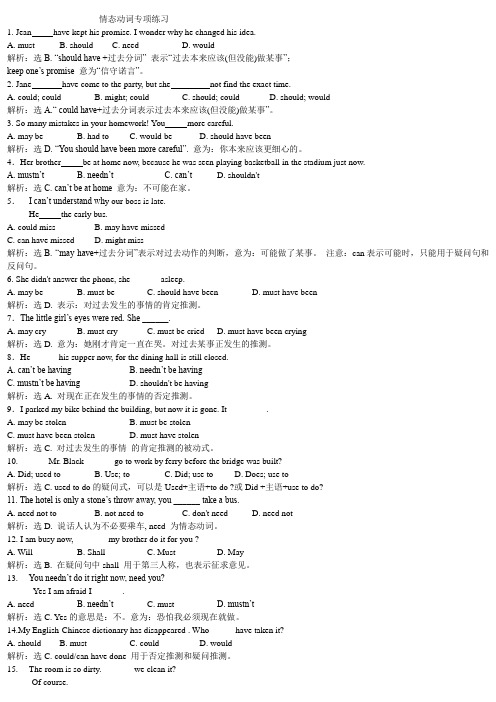
情态动词专项练习1. Jean have kept his promise. I wonder why he changed his idea.A. mustB. shouldC. needD. would解析:选B. “should have +过去分词” 表示“过去本来应该(但没能)做某事”;keep one’s promise 意为“信守诺言”。
2. Jane have come to the party, but she not find the exact time.A. could; couldB. might; couldC. should; couldD. should; would解析:选A.“ could have+过去分词表示过去本来应该(但没能)做某事”。
3. So many mistakes in your homework! You more careful.A. may beB. had toC. would beD. should have been解析:选D. “You should have been more careful”. 意为:你本来应该更细心的。
4.Her brother be at home now, because he was seen playing basketball in the stadium just now.A. mustn’tB. needn’tC. can’tD. shouldn't解析:选C. can’t be at home 意为:不可能在家。
5.---I can’t understand wh y our boss is late.---He the early bus.A. could missB. may have missedC. can have missedD. might miss解析:选B. “may have+过去分词”表示对过去动作的判断,意为:可能做了某事。
【英语】 情态动词练习题(含答案)
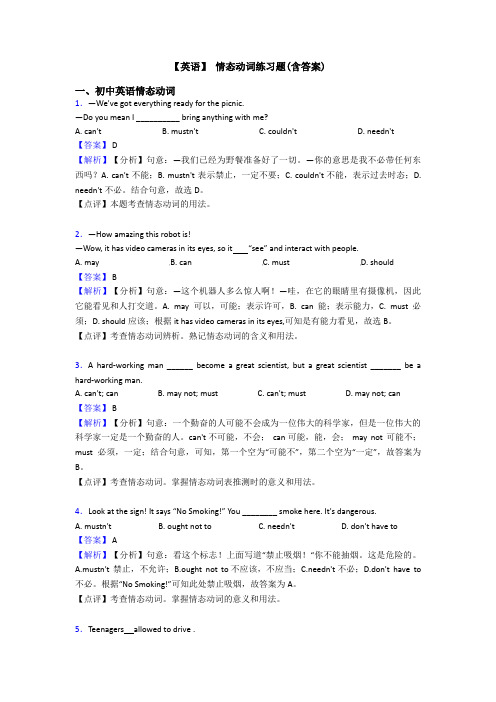
【英语】情态动词练习题(含答案)一、初中英语情态动词1.—We've got everything ready for the picnic.—Do you mean I __________ bring anything with me?A. can'tB. mustn'tC. couldn'tD. needn't【答案】 D【解析】【分析】句意:—我们已经为野餐准备好了一切。
—你的意思是我不必带任何东西吗?A. can't 不能;B. mustn't 表示禁止,一定不要;C. couldn't不能,表示过去时态;D. needn't不必。
结合句意,故选D。
【点评】本题考查情态动词的用法。
2.—How amazing this robot is!—Wow, it has video cameras in its eyes, so it “see” and interact with people.A. mayB. canC. mustD. should【答案】 B【解析】【分析】句意:—这个机器人多么惊人啊!—哇,在它的眼睛里有摄像机,因此它能看见和人打交道。
A. may 可以,可能;表示许可,B. can 能;表示能力,C. must 必须;D. should应该;根据it has video cameras in its eyes,可知是有能力看见,故选B。
【点评】考查情态动词辨析。
熟记情态动词的含义和用法。
3.A hard-working man ______ become a great scientist, but a great scientist _______ be a hard-working man.A. can't; canB. may not; mustC. can't; mustD. may not; can【答案】 B【解析】【分析】句意:一个勤奋的人可能不会成为一位伟大的科学家,但是一位伟大的科学家一定是一个勤奋的人。
英语情态动词练习题含答案
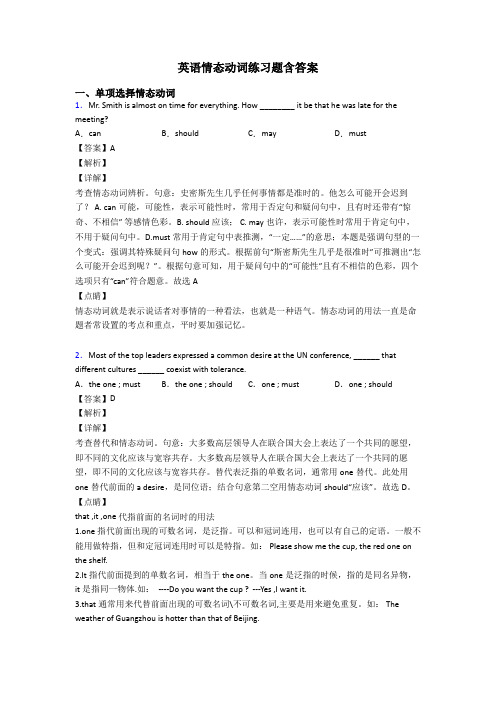
C.shouldD.will
【答案】B
【解析】
【详解】
考查情态动词。句意:——有一台计算机来储存照片真是太棒了。——不要过度依赖它。它有时候也会出故障,你最好做一个备份。计算机出故障这是可能的事情,表示客观可能性用can。must肯定,必须;should应该;will表意愿。故B选项正确。
11.-–Mary knows the city quite well.
--She______ well have been there before.
A.ne】D
【解析】
【分析】【详解】
考查情态动词辨析。句意:——Mary非常了解这个城市。——她肯定以前在那里呆过。may have done过去可能做过某事。表示对过去的肯定猜测。need have done本需要做某事却没做;could have done本可以做某事却没做;should have done本应该做某事却没做。故选D。
A.MayB.ShouldC.ShallD.Will
【答案】C
【解析】
【详解】
考查Shall的用法。句意:贝克先生,有些学生想见你。他们是在这里等还是在外面等?Shall用于第一、第三人称疑问句中,表示说话人征求对方的意见或向对方请示。故选C。
【点睛】
Shall的用法
Shall作为助动词,一般用于第一人称Ⅰ和We,表示一个将来的动作,构成将来时态。Shall后面接动词原形。例如:
【详解】
考查情态动词。句意:我们学校的校长最近通过了一项规定,要求学生在校园里穿校服。分析句子可知,“that students _______ wear school uniforms in our campus.”是同位语从句对名词“rule”内容解释说明。当表示强制,用于法令、条约、规章中,意为“必须,应该”等时句子用情态动词shall。故选D。
【英语】高考英语情态动词题20套(带答案)及解析
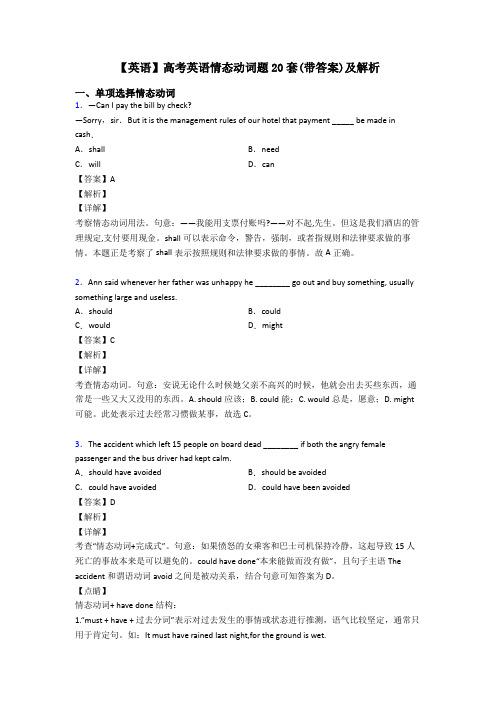
【英语】高考英语情态动词题20套(带答案)及解析一、单项选择情态动词1.—Can I pay the bill by check?—Sorry,sir.But it is the management rules of our hotel that payment _____ be made in cash.A.shall B.needC.will D.can【答案】A【解析】【详解】考察情态动词用法。
句意:——我能用支票付账吗?——对不起,先生。
但这是我们酒店的管理规定,支付要用现金。
shall可以表示命令,警告,强制,或者指规则和法律要求做的事情。
本题正是考察了shall表示按照规则和法律要求做的事情。
故A正确。
2.Ann said whenever her father was unhappy he ________ go out and buy something, usually something large and useless.A.should B.couldC.would D.might【答案】C【解析】【详解】考查情态动词。
句意:安说无论什么时候她父亲不高兴的时候,他就会出去买些东西,通常是一些又大又没用的东西。
A. should应该;B. could能;C. would总是,愿意;D. might 可能。
此处表示过去经常习惯做某事,故选C。
3.The accident which left 15 people on board dead ________ if both the angry female passenger and the bus driver had kept calm.A.should have avoided B.should be avoidedC.could have avoided D.could have been avoided【答案】D【解析】【详解】考查“情态动词+完成式”。
情态动词专项练习题及答案
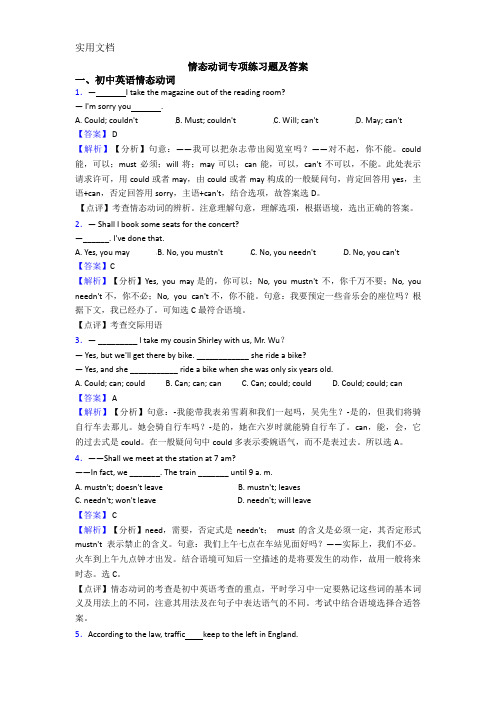
情态动词专项练习题及答案一、初中英语情态动词1.— I take the magazine out of the reading room?— I'm sorry you .A. Could; couldn'tB. Must; couldn'tC. Will; can'tD. May; can't【答案】 D【解析】【分析】句意:——我可以把杂志带出阅览室吗?——对不起,你不能。
could 能,可以;must必须;will将;may可以;can能,可以,can't不可以,不能。
此处表示请求许可,用could或者may,由could或者may构成的一般疑问句,肯定回答用yes,主语+can,否定回答用sorry,主语+can't,结合选项,故答案选D。
【点评】考查情态动词的辨析。
注意理解句意,理解选项,根据语境,选出正确的答案。
2.— Shall I book some seats for the concert?—______. I've done that.A. Yes, you mayB. No, you mustn'tC. No, you needn'tD. No, you can't【答案】C【解析】【分析】Yes, you may是的,你可以;No, you mustn't 不,你千万不要;No, you needn't不,你不必;No, you can't不,你不能。
句意:我要预定一些音乐会的座位吗?根据下文,我已经办了。
可知选C最符合语境。
【点评】考查交际用语3.— _________ I take my cousin Shirley with us, Mr. Wu?— Yes, but we'll get there by bike. ____________ she ride a bike?— Yes, and she ___________ ride a bike when she was only six years old.A. Could; can; couldB. Can; can; canC. Can; could; couldD. Could; could; can【答案】 A【解析】【分析】句意:-我能带我表弟雪莉和我们一起吗,吴先生?-是的,但我们将骑自行车去那儿。
情态动词专项练习(附答案)
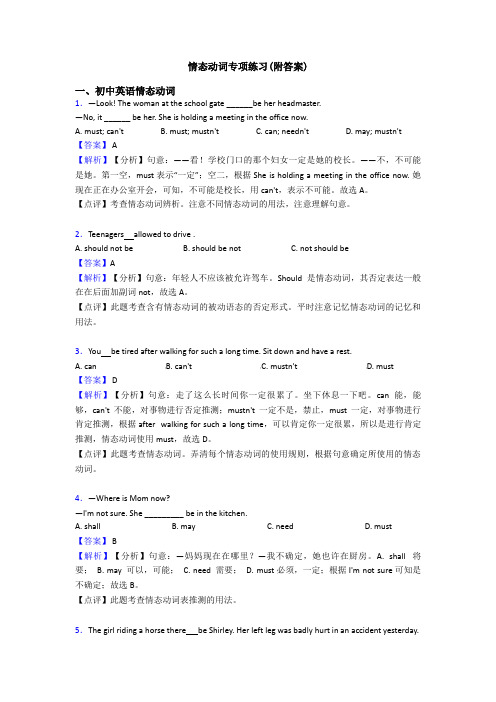
情态动词专项练习(附答案)一、初中英语情态动词1.—Look! The woman at the school gate ______be her headmaster.—No, it ______ be her. She is holding a meeting in the office now.A. must; can'tB. must; mustn'tC. can; needn'tD. may; mustn't【答案】 A【解析】【分析】句意:——看!学校门口的那个妇女一定是她的校长。
——不,不可能是她。
第一空,must表示“一定”;空二,根据She is holding a meeting in the office now. 她现在正在办公室开会,可知,不可能是校长,用can't,表示不可能。
故选A。
【点评】考查情态动词辨析。
注意不同情态动词的用法,注意理解句意。
2.Teenagers allowed to drive .A. should not beB. should be notC. not should be【答案】A【解析】【分析】句意:年轻人不应该被允许驾车。
Should是情态动词,其否定表达一般在在后面加副词not,故选A。
【点评】此题考查含有情态动词的被动语态的否定形式。
平时注意记忆情态动词的记忆和用法。
3.You be tired after walking for such a long time. Sit down and have a rest.A. canB. can'tC. mustn'tD. must【答案】 D【解析】【分析】句意:走了这么长时间你一定很累了。
坐下休息一下吧。
can能,能够,can't不能,对事物进行否定推测;mustn't一定不是,禁止,must一定,对事物进行肯定推测,根据after walking for such a long time,可以肯定你一定很累,所以是进行肯定推测,情态动词使用must,故选D。
情态动词专项练习(含答案和解析)

情态动词专项练习(含答案和解析)1.Our XXX.2.To my joy。
we don't need to go to the bank。
Mary has lent us some money.3.- Do we have to finish this today?Yes。
you must。
Today is the last day.4.Sorry。
smoking is not allowed here。
If you do。
you will be fined according to the rules.5.- Is it really necessary for me to wear a mask when shopping?I'm afraid you must in public。
It is not only to XXX.6.Hurry up。
or we will miss the beginning of the film.7.- How do you like my new dress?Well。
if I must say。
it is not suitable for you.8.- Do the children have to leave at six tomorrow morning?16."Please don't make so much noise。
I can't hear the speaker very well."17."We've discussed every detail of this plan and have got everything ready。
But still something may go wrong。
We still have to be very careful."18."XXX。
【英语】英语情态动词题20套(带答案)及解析
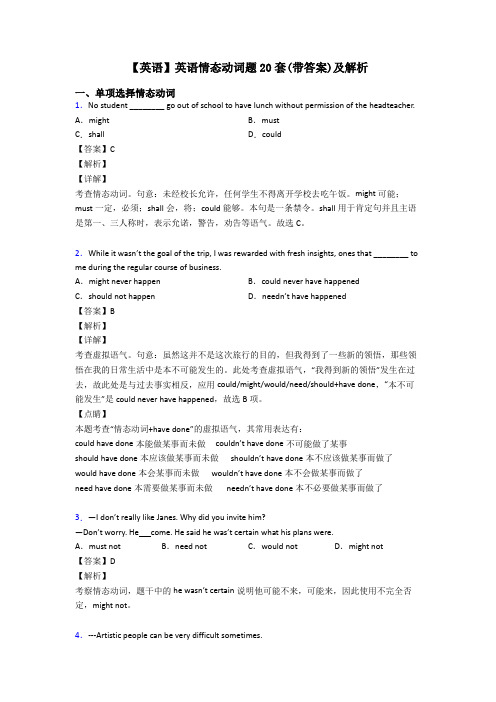
【英语】英语情态动词题20套(带答案)及解析一、单项选择情态动词1.No student ________ go out of school to have lunch without permission of the headteacher. A.might B.mustC.shall D.could【答案】C【解析】【详解】考查情态动词。
句意:未经校长允许,任何学生不得离开学校去吃午饭。
might可能;must一定,必须;shall会,将;could能够。
本句是一条禁令。
shall用于肯定句并且主语是第一、三人称时,表示允诺,警告,劝告等语气。
故选C。
2.While it wasn’t the goal of the trip, I was rewarded with fresh insights, ones that ________ to me during the regular course of business.A.might never happen B.could never have happenedC.should not happen D.needn’t h ave happened【答案】B【解析】【详解】考查虚拟语气。
句意:虽然这并不是这次旅行的目的,但我得到了一些新的领悟,那些领悟在我的日常生活中是本不可能发生的。
此处考查虚拟语气,“我得到新的领悟”发生在过去,故此处是与过去事实相反,应用could/might/would/need/should+have done,“本不可能发生”是could never have happened,故选B项。
【点睛】本题考查“情态动词+have done”的虚拟语气,其常用表达有:could have done本能做某事而未做couldn’t have done不可能做了某事should have done本应该做某事而未做shouldn’t have done本不应该做某事而做了would have done本会某事而未做wouldn’t have done本不会做某事而做了need have done本需要做某事而未做needn’t have done本不必要做某事而做了3.—I don’t really like Janes. Why did you invite him?—Don’t worry. He come. He said he was’t certain what his plans were.A.must not B.need not C.would not D.might not【答案】D【解析】考察情态动词,题干中的he wasn’t certain说明他可能不来,可能来,因此使用不完全否定,might not。
(完整版)情态动词练习题附答案
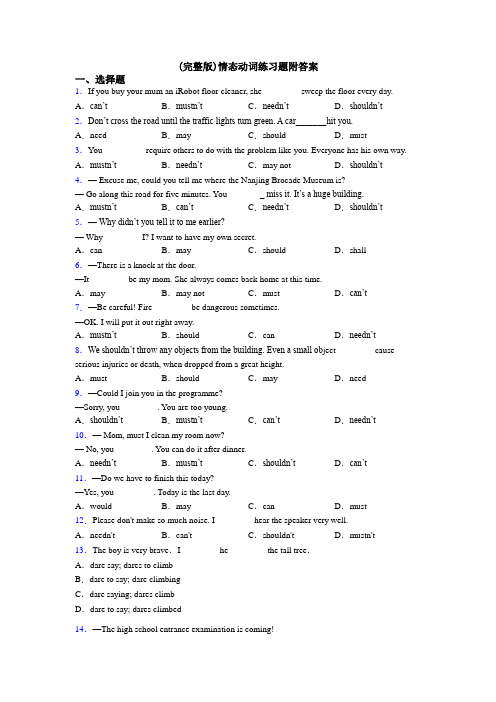
(完整版)情态动词练习题附答案一、选择题1.If you buy your mum an iRobot floor cleaner, she ________ sweep the floor every day. A.can’t B.mustn’t C.needn’t D.shouldn’t 2.Don’t cross the road until the traffic lights turn green. A car_______hit you.A.need B.may C.should D.must3.You ________ require others to do with the problem like you. Everyone has his own way. A.mustn’t B.needn’t C.may not D.shouldn’t 4.— Excuse me, could you tell me where the Nanjing Brocade Museum is?— Go along this road for five minutes. You ________ miss it. It’s a huge building. A.mustn’t B.can’t C.needn’t D.shouldn’t 5.—Why didn’t you tell it to me earlier?— Why ________ I? I want to have my own secret.A.can B.may C.should D.shall 6.—There is a knock at the door.—It ________ be my mom. She always comes back home at this time.A.may B.may not C.must D.can’t7.—Be careful! Fire ________ be dangerous sometimes.—OK. I will put it out right away.A.mustn’t B.should C.can D.needn’t 8.We shouldn’t throw any objects from the building. Even a small ob ject ________ cause serious injuries or death, when dropped from a great height.A.must B.should C.may D.need 9.—Could I join you in the programme?—Sorry, you ________. You are too young.A.shouldn’t B.mustn’t C.can’t D.needn’t 10.— Mom, must I clean my room now?— No, you ________. You can do it after dinner.A.needn’t B.mustn’t C.shouldn’t D.can’t 11.—Do we have to finish this today?—Yes, you ________ . Today is the last day.A.would B.may C.can D.must 12.Please don't make so much noise. I ________ hear the speaker very well.A.needn't B.can't C.shouldn't D.mustn't 13.The boy is very brave.I ________ he ________ the tall tree.A.dare say; dares to climbB.dare to say; dare climbingC.dare saying; dares climbD.dare to say; dares climbed14.—The high school entrance examination is coming!—Yes, our teacher tells us we _______ be too careful while taking exams.A.mustn't B.shouldn't C.needn't D.can't15.When I was young, my father ___________ take me to climb the hill which was not far from our house.A.may B.must C.would D.should16.My bike was broken yesterday,so I____walk home.A.might B.had to C.must D.could 17.—Would you please________in that way? That’s not safe!—Sorry. I won’t do it any more.A.not driving B.not to drive C.no driving D.not drive 18.—Will your mother be at home this Saturday?—Hard to say. She _______go to the countryside to see my grandparents.A.must B.may C.can D.would19.Think twice before making a decision, or you __________ get into trouble.A.may B.can't C.shouldn't D.mustn't20.You'd better __________ hard from now on, __________ you will fail the exam. A.work; and B.working; or C.working; and D.work; or 21.—Excuse me. I haven’t finished reading the book yet. May I keep it a bit longer?— Sorry, you ________. You must return it on time.A.needn’t B.can’t C.won’t D.shouldn’t 22.— Listen! Tom ________ be listening to the music while doing his homework.—Let’s go upstairs to remind him to turn it off.A.should B.could C.would D.must 23.—Suzy described every detail of the accident just now.—Her memory ________ be completely back.A.shall B.need C.must D.could24.Most young people like shopping online because they ________ spend much time going from shop to shop.A.needn’t B.can’t C.mustn’t D.shouldn’t 25.—In China, many parents complain that their children have to stay up late to do the homework.—Don’t worry. The government has realized the problem. I’m sure there ________ be good news soon.A.can B.should C.need D.must26.I think all the students love the weekends because, to them, they ________ get up early on Saturdays or Sundays.A.mustn’t B.don’t need C.needn’t D.can’t27.— Is the boy over there Tom? He often wears a jacket like that.— It _______ be him. He is absent from school today.A.needn’t B.shouldn’t C.mustn’t D.can’t28.When people are waiting at the zebra crossing, cars and buses ________ wait and let them go first.A.must B.may C.can D.need29.Hurry up, or we ________ miss the beginning of the film.A.should B.must C.may D.have to 30.—Will dad arrive home at 6 o’cl ock to have dinner with us this evening?— I think he will, but he ________ not. Sometimes he works extra hours.A.can B.must C.need D.may31.A hard-working man ________ become a great scientist, but a great scientist ________ be a hard-working man.A.can’t; can B.may not; must C.can’t; must D.may not; can 32.Cars ________ give way to walkers on some roads in Binhai, or the drivers will be fined. A.may B.will C.can D.must33.—The article says that a person’s animal sign decides his personality.—You ________ read it for fun, but don’t believe in that.A.can B.must C.shouldn’t D.needn’t 34.—How beautiful the winter jasmines (迎春花) are!—Yes. These golden-yellow flowers ________ be widely seen in my city in March.A.must B.can C.would D.should 35.—Mum, I bought some strawberries on my way home.—Oh, you’re so sweet. But the strawberries ________ be put into the fridge for freshness. A.must B.can C.may D.need36.— What do you think of the show yesterday?— Some of them were really good but others ________ be better.A.will B.must C.need D.can37.—In China, many students have to stay up late to do their homework.—No worries. The government has realized the problem. I’m sure there ________ be good news soon.A.can B.should C.must D.need 38.—Who’s the man over there? Is that Mr. Black?—It ________ be him. Mr. Black is much taller than that man.A.may B.must C.can’t D.mustn’t39.We teenagers ________ have dreams. With dreams and hard work, anything amazing________ be created.A.may; can B.might; should C.should; can D.must; has to 40.—Shall I tell him the change of the time right now?—I’m afraid you ________, otherwise he will be late for the meeting.A.can B.may C.must D.need【参考答案】一、选择题1.C解析:C【详解】句意:如果你给你妈妈买一台扫地机器人,她就不必每天扫地了。
(完整版)情态动词练习题及答案
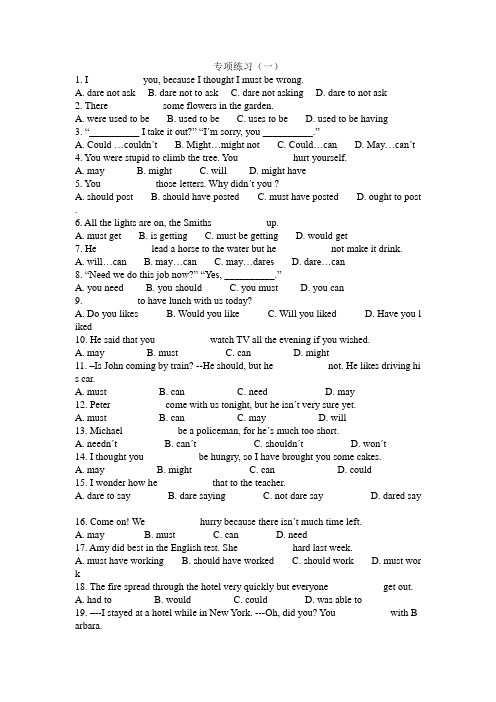
专项练习(一)1. I __________ you, because I thought I must be wrong.A. dare not askB. dare not to askC. dare not askingD. dare to not ask2. There __________ some flowers in the garden.A. were used to beB. used to beC. uses to beD. used to be having3. “__________ I take it out?”“I´m sorry, you __________.”A. Could …couldn´tB. Might…might notC. Could…canD. May…can´t4. You were stupid to climb the tree. You __________ hurt yourself.A. mayB. mightC. willD. might have5. You __________ those letters. Why didn´t you ?A. should postB. should have postedC. must have postedD. ought to post .6. All the lights are on, the Smiths __________ up.A. must getB. is gettingC. must be gettingD. would get7. He __________ lead a horse to the water but he __________ not make it drink.A. will…canB. may…canC. may…daresD. dare…can8. “Need we do this job now?”“Yes,__________.”A. you needB. you shouldC. you mustD. you can9. __________ to have lunch with us today?A. Do you likesB. Would you likeC. Will you likedD. Have you l iked10. He said that you __________ watch TV all the evening if you wished.A. mayB. mustC. canD. might11. –Is John coming by train? --He should, but he __________ not. He likes driving hi s car.A. mustB. canC. needD. may12. Peter __________ come with us tonight, but he isn´t very sure yet.A. mustB. canC. mayD. will13. Michael __________ be a policeman, for he´s much too short.A. needn´tB. can´tC. shouldn´tD. won´t14. I thought you __________ be hungry, so I have brought you some cakes.A. mayB. mightC. canD. could15. I wonder how he __________ that to the teacher.A. dare to sayB. dare sayingC. not dare sayD. dared say16. Come on! We __________ hurry because there isn´t much time left.A. mayB. mustC. canD. need17. Amy did best in the English test. She __________ hard last week.A. must have workingB. should have workedC. should workD. must wor k18. The fire spread through the hotel very quickly but everyone __________ get out.A. had toB. wouldC. couldD. was able to19. –--I stayed at a hotel while in New York. ---Oh, did you? You __________ with B arbara.A. could have stayedB. could stayC. would stayD. must have stay ed20. It´s nearly seven o´clock. Jack __________ be here at any moment.A. mustB. needC. shouldD. can答案: 1.A2.B3.D4.D5.B6.C7.B8.C9.B10.D11.D12.C13.B14.B15.D16.B17.A18.D19. A20.专项练习(二)1. Jean have kept his promise. I wonder why he changed his idea.A. mustB. shouldC. needD. would2. Jane have come to the party, but she not find the exact time.A. could; couldB. might; couldC. should; couldD. should; would3. So many mistakes in your homework! You more careful.A. may beB. had toC. would beD. should have been4.Her brother be at home now, because he was seen playing basketball in the stadium just now. A. mustn’t B. needn’t C. can’t D. shouldn't5.---I can’t understand why our boss is late. ---He the early bus.A. could missB. may have missedC. can have missedD. might miss6. She didn't answer the phone, she ______ asleep.A. may beB. must beC. should have beenD. must have been 7.The little girl’s eyes were red. She ______.A. may cryB. must cryC. must be criedD. must have been crying 8.He______ his supper now, for the dining hall is still closed.A. can’t b e havingB. needn’t be havingC. mustn’t be havingD. shouldn't be having9.I parked my bike behind the building, but now it is gone. It ________ .A. may be stolenB. must be stolenC. must have been stolenD. must have stolen10. ______ Mr. Black_______go to work by ferry before the bridge was built?A. Did; used toB. Use; toC. Did; use toD. Does; use to11. The hotel is only a stone’s throw away, you ______ take a bus.A. need not toB. not need toC. don't needD. need not12. I am busy now, _______ my brother do it for you ?A. WillB. ShallC. MustD. May13. ---You needn’t do it right now, need you?---Yes I am afraid I ______ .A. needB. needn’tC. mustD. mustn’t14.My English-Chinese dictionary has disappeared . Who _____ have taken it? (2003年上海春季高考) A. should B. must C. could D. would 15. ---The room is so dirty._______ we clean it?----Of course. (2003年北京春季高考)A.Will B. Shall C. Would D. Do16. If you have something important to do, you ______ waste any time.A. needn’tB. mustn’tC. may notD. won’t17. If you want to borrow a football after school, your student card______ here.A. has to leaveB. must leaveC. has to be leftD. must be left18. “ Did you scold him for his carelessness?”“Yes, but _____ it”A. I’d rather not doB. I’d rather not have doneC. I shouldn’t doD. I’d better not do19. “ Don’t get near to it . It is too dangerous!”“_______” .A. Yes, I won’tB. No, I don’tC. No, I can’tD. No, I won’t20. He must be in the classroom, _______ he?A. mustn’tB. can’tC. isn’tD.can21. He________ be in the garden. He must be in the room.A. can’tB. mustn’tC. will notD. may not22. “Do you have to leave now?”“I am very sorry, but I really______.”A. can’tB. haveC. shouldD. must23. “Let’s go to the library, shall we?”“_________?”A. No, I can’tB. Yes, I willC. Yes , thank youD. No, we’d better not24. “Can I take it away?”“ You ______ better not.”A. shouldB. couldC. wouldD. had25. You _______ have brought your camera. They all had theirs with them.A. couldn’tB. needn’tC. wouldn’tD. mustn’t26. See who is there!______it be May?A. MayB. MustC. CanD. Will27. John______ be a basketball player. He is much too short.A. mayB. mustn’tC. can’tD. should28. The Chinese teacher looks so pale. She ______ be ill.A. mustB. mustn’tC. canD. need29. Something______to save our earth. Do you think so?A. can doB. must doC. has to doD. must be done30. Look at what you have done! You ______ be more careful.A. oughtB. canC. wouldD. Should1-5:BADCB 6-10:DDACC 11-15:DBCCB 16-20:BCBDC 21-25:ADDDB 26-30:CCADD专项练习(三)1. I didn’t see her in the meeting room this morning. She _____ at the meeting.A. mustn’t have spokenB. shouldn’t have spokenC. needn’t have spokenD. couldn’t have spoken2. One ought _____ for what one hasn’t done.A. not to be punishedB. to not be punishedC. to not punishedD. not be punished3. If you really want yourself to be in good health, you must ___ always ___ so much.A. not; be smokingB. not; have smokedC. not; to smokeD. be not; smoking4. With so much work on hand, you _____ to see the game last night.A. mustn’t goB. shouldn’t goC. couldn’t have goneD. shouldn’t have gone5. Most of the students felt rather disappointed at the English party. They say that it ______ better organized.A. had beenB. had to beC. must have beenD. could have been6. I’m surprised that he _____ in the exam.A. should failB. would have failedC. may have failedD. should have failed7. The little girl _____ there alone.A. not dare goB. dares not goC. dare not goD. dare not to go8. “Must we do it now?” “No, you _____.”A. won’tB. needn’tC. can’tD. don’t9. He said he would rather not _____ it right now.A. doingB. to doC. doD. to be doing10. You _____ to the meeting this afternoon if you have something important to do.A. needn’t to comeB. don’t need comeC. don’t need comingD. needn’t come11. Put on more clothes. You _____ be feeling cold with only a shirt on.A. canB. couldC. wouldD. must12. I _____ play football than baseball.A. would ratherB. had betterC. like betterD. prefer13. I thought you _____ like something to read, so I have brought you some books.A. mayB. mightC. couldD. must14. There was plenty of times. She _____.A. mustn’t have hurriedB. couldn’t have hurriedC. must not hurryD. needn’t have hurried15. The plant is dead. I _____ it more water.A. will giveB. would have givenC. must giveD. should have given16. You _____ return the book now. You can keep it till next week if you like.A. can’tB. mustn’tC. needn’tD. may not17. It’s still early, you _____.A. mustn’t hurryB. wouldn’t hurryC. may not hurryD. don’t have to hurry18. Please open the window, _____?A. can’t youB. aren’t youC. do youD. will you19. We _____ for her because she never came.A. mustn’t have waitedB. shouldn’t have waitedC. mustn’t waitD. needn’t wait20. — May I stop here? — No, you _____.A. mustn’tB. might notC. needn’tD. won’t21. It’s a fine day. Let’s go fishing, _____.A. won’t weB. will weC. don’t weD. shall we22. I didn’t see her in the meeting room this morning. She _____ at the meeting.A. mustn’t have spokenB. shouldn’t have spokenC. needn’t have spokenD. couldn’t have spoken23. — Please don’t make a noise. — _____. I’ll be as quiet as a mouse.A. Yes, I won’tB. No, I won’tC. No, I willD. Yes, I will24. The young man has made so much noise that he _____ not have been allowed to attend the concert.A. couldB. mustC. wouldD. should25. — Where is John? — He _____ in the library.A. should beB. must beC. can beD. must have been26. Since the road is wet this morning, _____ last night.A. it must rainB. it must be rainingC. it must have rainedD. it must have been rain27. — Will your brother stay home tonight?— I’m not quite sure. He _____ to the cinema tonight.A. must goB. can goC. may goD. may be going28. She’s already two hours late. What ______ to her?A. can have happenedB. may have happenedC. should have happenedD. must happen29. You must be a writer, _____?A. mustn’t youB. are youC. must youD. aren’t you30. I got up early that morning, but I _____ so because I had no work to do.A. mustn’t have doneB. didn’t need to doC. needn’t have doneD. can’t have done31. He _____ have come here yesterday, but he didn’t.A. couldB. shouldC. ought toD. all the above32. I missed the last bus, so I _____ go home on foot.A. mustB. have toC. mayD. had to33. He ought to win the first prize, _____ he?A. oughtn’tB. shouldn’tC. mustn’tD. both A and B34. Everyone _____ do his best for the modernizations of our country.A. canB. mayC. shouldD. might35. Let’s clean our classroom, _____?A. will youB. don’t weC. shall weD. do you36. Let us play basketball, ______?A. will youB. don’t weC. shall weD. do you37. He asked me for this book many times. Please tell him that he _____ have it tomorrow.A. mustB. mayC. shallD. both B and C38. “Your phone number again? I _____ quite catch it.” “It’s 9568442.”A. didn’tB. couldn’tC. don’tD. can’t39. Mother _____ us stories when we were children.A. was used to tellB. is used to tellingC. used to tellD. used to telling40. She would rather _____ more money on books _____ on clothes.A. cost … notB. to spare … don’tC. pay … thanD. spend … than 答案:1-5 DAADD 6-10 DCBCD 11-15DABDD 16-20 CDDBA 21-25DDBDB 26-30CCADC31-35 DDDCC 36-40ADACD。
情态动词专项练习及答案详解
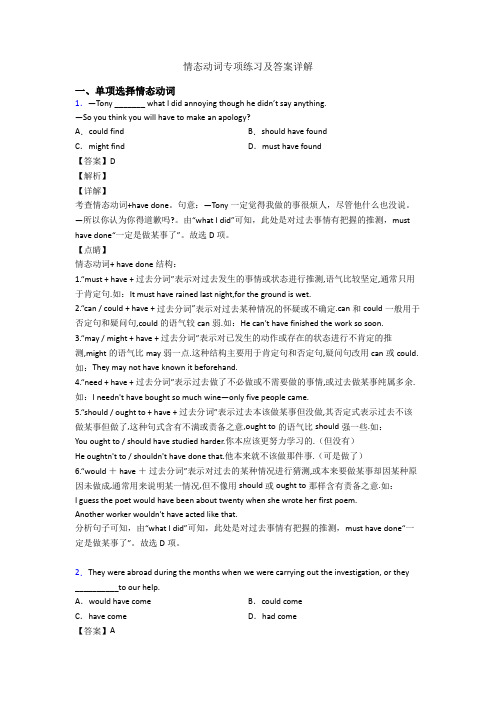
情态动词专项练习及答案详解一、单项选择情态动词1.—Tony _______ what I did annoying though he didn’t say anything.—So you think you will have to make an apology?A.could find B.should have foundC.might find D.must have found【答案】D【解析】【详解】考查情态动词+have done。
句意:—Tony一定觉得我做的事很烦人,尽管他什么也没说。
—所以你认为你得道歉吗?。
由“what I did”可知,此处是对过去事情有把握的推测,must have done“一定是做某事了”。
故选D项。
【点睛】情态动词+ have done结构:1.“must + have + 过去分词”表示对过去发生的事情或状态进行推测,语气比较坚定,通常只用于肯定句.如:It must have rained last night,for the ground is wet.2.“can / could + have + 过去分词”表示对过去某种情况的怀疑或不确定.can和could一般用于否定句和疑问句,could的语气较can弱.如:He can't have finished the work so soon.3.“may / might + have + 过去分词”表示对已发生的动作或存在的状态进行不肯定的推测,might的语气比may弱一点.这种结构主要用于肯定句和否定句,疑问句改用can或could.如:They may not have known it beforehand.4.“need + have + 过去分词”表示过去做了不必做或不需要做的事情,或过去做某事纯属多余.如:I needn't have bought so much wine—only five people came.5.“should / ought to + have + 过去分词”表示过去本该做某事但没做,其否定式表示过去不该做某事但做了,这种句式含有不满或责备之意,ought to的语气比should强一些.如:You ought to / should have studied harder.你本应该更努力学习的.(但没有)He oughtn't to / shouldn't have done that.他本来就不该做那件事.(可是做了)6.“would + have +过去分词”表示对过去的某种情况进行猜测,或本来要做某事却因某种原因未做成,通常用来说明某一情况,但不像用should或ought to那样含有责备之意.如:I guess the poet would have been about twenty when she wrote her first poem.Another worker wouldn't have acted like that.分析句子可知,由“what I did”可知,此处是对过去事情有把握的推测,must have done“一定是做某事了”。
情态动词专项练习(附答案)
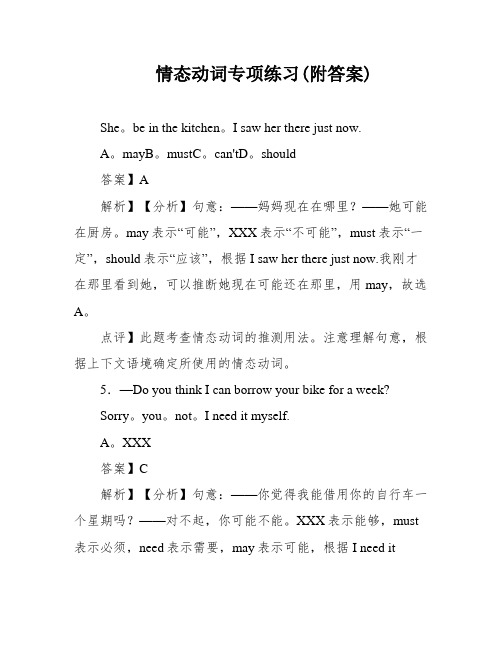
情态动词专项练习(附答案)She。
be in the kitchen。
I saw her there just now.A。
mayB。
mustC。
can'tD。
should答案】A解析】【分析】句意:——妈妈现在在哪里?——她可能在厨房。
may表示“可能”,XXX表示“不可能”,must表示“一定”,should表示“应该”,根据I saw her there just now.我刚才在那里看到她,可以推断她现在可能还在那里,用may,故选A。
点评】此题考查情态动词的推测用法。
注意理解句意,根据上下文语境确定所使用的情态动词。
5.—Do you think I can borrow your bike for a week?Sorry。
you。
not。
I need it myself.A。
XXX答案】C解析】【分析】句意:——你觉得我能借用你的自行车一个星期吗?——对不起,你可能不能。
XXX表示能够,must 表示必须,need表示需要,may表示可能,根据I need itmyself.我自己需要用,可以推断你可能不能借用,用may,故选C。
点评】此题考查情态动词的推测用法。
注意理解句意,根据上下文语境确定所使用的情态动词。
5.那个骑马的女孩不可能是XXX,因为她的左腿在昨天的事故中受了重伤。
因此,可以推测她不可能骑马,选项C 表示否定的推测,所以选C。
6.我们已经点了太多的食物,我不能再吃了。
选项A表示不能,符合句意,所以选A。
对方提议将剩余的食物带回家,表示不浪费,也是可以接受的。
5.那个骑马的女孩可能不是XXX,因为她的左腿在昨天的事故中受了重伤。
因此,可以推测她不可能骑马,选项C 表示否定的推测,所以选C。
6.我们已经点了太多的食物,我不能再吃了。
选项A表示不能,符合句意,所以选A。
对方提议将剩余的食物带回家,表示不浪费,也是一个好主意。
1.今天暑假你有什么计划吗?我还没有确定,但可能会去台湾旅行。
英语情态动词题20套(带答案)及解析
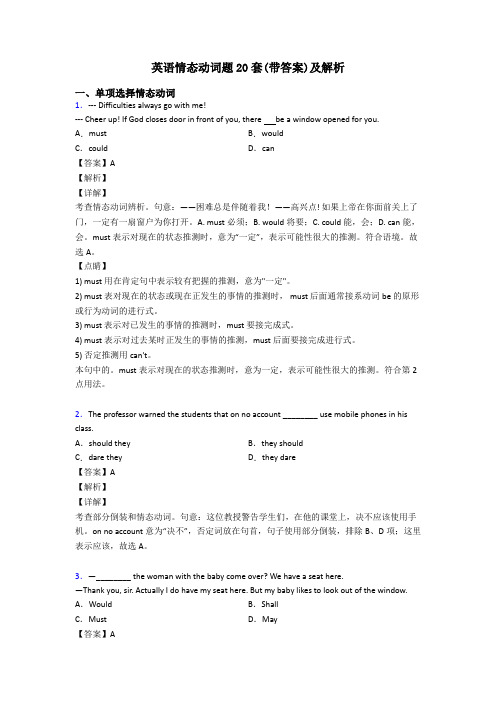
A.shallB.must
C.canD.should
【答案】D
【解析】
【详解】
考查情态动词。句意:我仍然难以想象这样聪明的孩子竟然犯这样愚蠢的错误。should作为情态动词,可以用来表示意外、惊喜或者在说话人看来是不可思议的,常常译为"竟会"、"居然",这么聪明的孩子竟然犯这样愚蠢的错误。表示意外,shall表示允诺,命令等,must表示必须,can表示能力及可能性。所以答案选D。
【答案】B
【解析】
试题分析:考查情态动词用法。Shouldn’t have done本不应该做某事,实际上却做了(虚拟语气);couldn’t have done不可能做某事(对过去情况的推测);needn’t have done本不需要做某事,实际上却做了(虚拟语气);句意:我的姐姐昨天下午在街上遇见了他,所以他不可能去听了你的演讲。故B正确。
3. shall用于第一、第三人称疑问句中,表示说话人征求对方的意见或向对方请示。如:Shall we begin our lesson? When shall he be able to leave the hospital?
4. shall用于第二、第三人称,表示说话人给对方命令、警告、允诺或威胁。如:You shall fail if you don't work harder.(警告)He shall have the book when I finish reading.(允诺)He shall be punished.(威胁)
(完整版)情态动词专项练习(含答案)
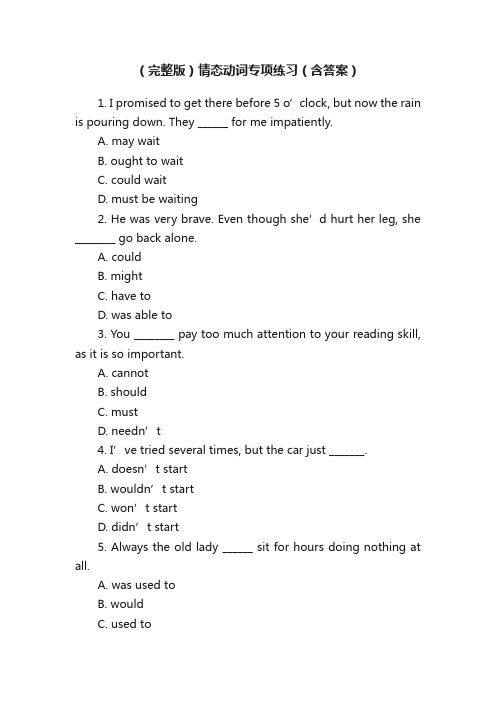
(完整版)情态动词专项练习(含答案)1. I promised to get there before 5 o’clock, but now the rain is pouring down. They ______ for me impatiently.A. may waitB. ought to waitC. could waitD. must be waiting2. He was very brave. Even though she’d hurt her leg, she ________ go back alone.A. couldB. mightC. have toD. was able to3. You ________ pay too much attention to your reading skill, as it is so important.A. cannotB. shouldC. mustD. needn’t4. I’ve tried several times, but the car just _______.A. doesn’t startB. wouldn’t startC. won’t startD. didn’t start5. Always the old lady ______ sit for hours doing nothing at all.A. was used toB. wouldC. used toD. should6. There used to be a small school,___________?A. was thereB. wasn’t itC. usedn’t thereD. usedn’t it7. Our house is on the top of the hill, so in summer the wind _____ be pretty cold.A. mustB. canC. ought toD. need8. Haven’t I told you that you __________ have the ans wer tomorrow morning?A. willB. shallC. shouldD. would9. I’m surprised that he _______ in the match.A. should failB. should have failedC. would have failedD. may have failed10. Better go to see my sick colleague right now, ________I?A. hadn’tB. didn’tC. don’tD. won’t11. Sir, you ______ be hunting deer here, for they are preserved by the government.A. oughtn’t toB. can’tC. won’tD. needn’t12. Sorry I’m late. I ______ have turned off the alarm clock and gone back to sleep again.A. mightB. shouldC. canD. will13. —There were already five people in the car, but they managed to take me as well.— It __________ a comfortable journey.A. can’tB. shouldn’t beC. must have beenD. couldn’t have been14. To be on the safe side, we should fill up the tank now, because we ______ run out of gas on the way.A. canB. wouldC. mightD. should15. ____ three people who travel together, there _____ be at least one who ____ be my teacher.A. Between; can; willB. In; should; couldC. Among; will; mayD. Of; must; can16. —Could you lend me that book you ______ me aboutwhen I telephoned you?—No, I am sorry, I can’t. I gave it to a friend.A. were tellingB. would tellC. had toldD. had been telling17. —We need a person badly to think up such an idea.—_______ the new comer have a try?A. ShallB. MayC. ShouldD. Need18. We ________ so tired. We’ve only been to a party.A. mustn’t have feltB. wouldn’t have feltC. shouldn’t have feltD. couldn’t have felt19. Professor Smith, many students want to see you. __________ they wait here or outside?A. DoB. ShallC. WillD. Would20. —How about paying a visit to Mr. Richardson, our former history teacher?—Good idea. I will e-mail him today so he _____know _________ to expect us.A. shall; whyB. may; whenC. would; whyD. will; how21. —I went to work on foot yesterday, though it _________ cats and dogs.—You __________ by bus. It was likely to get a cold.A. is raining; must have goneB. rained; would goC. was mining; should have goneD. have rained; could have gone22. You ______ pay too much attention to your reading skill, as it is so important.A. cannotB. shouldC. mustD. needn’t23. I told Sally to fix him up with this job, but perhaps I _________ it out for her.A. had to writeB. must have writtenC. should have writtenD. ought to write24. My sister met him at the Grand Theatre yesterday afternoon, so he ________ your lecture.A. couldn’t have attendedB. needn’t have attendedC. mustn’t have attendedD. shouldn’t have attended25. Research findings show we spend about two hours dreaming every night, no matter what we ________ during the day.A. should have doneB. would have doneC. may have doneD. must have done26. —Is there any flight to Tokyo today?— I think there _____, for the weather is too bad.A. mustn’t beB. mightn’t beC. needn’t beD. can’t be27. —I’m told that John had another car accident this morning.— I believe not. He _____ so careless.A. shouldn’t have beenB. wouldn’t have beenC. couldn’t have beenD. mustn’t have be en28. It was playing computer games that cost the boy a lot of time that he __________ doing his lessons.A. might have spentB. ought to have spentC. must have spentD. could have spent29. —I didn’t know you were good friends.—You _______. I have known her since she moved here. You were studying abroad then.A. may haveB. needn’t haveC. couldn’t haveD. must have30. They must have finished the work by the end of last month, __________?A. mustn’t theyB. haven’t theyC. hadn’t theyD. didn’t they31. —I didn’t see her yesterday.— Of course, you _____, because he had gone for a trip.A. can’tB. may not haveC. can’t haveD. mustn’t have32. You ________ phone him if you want to, but you _________. He is sure to phone you.A. may; mustn’tB. have t o; needn’tC. can; doesn’t needD. can; needn’t33. — She must have gone back to the valley.— ______, she _____ have. The entrance to it was nowhere to be found.A. No; mustn’tB. Yes; mightC. Yes; couldD. No; couldn’t34. He _____ full marks, but he was so careless as to make a spelling mistake.A. must have gainedB. can have gainedC. could have gainedD. must gain35. From what you said, she _____ you about it.A. mustn’t have toldB. can’t have toldC. mustn’t tellD. can’t tell36. — You ought to have made an apology to Tom yesterday evening.— Yes, I know I _________.A. ought toB. have toC. should haveD. must have37. —Is there a fog in the evening?—There _______ be. I’ll make a phone call to find it out.A. mustB. wouldC. willD. might38. — _______ he help you with the problem?—Well, though it is very hard, __________ I’ll do what I can to work it out.A. Shall; butB. Can; andC. Must; howeverD. Will; still39. —How is that, Joan?—Yeah, it’s from the boss. She _________ first, whether she likes it.A. shall goB. ought to have goneC. should goD. must have gone40. —Would you like to watch the video, in which you can see foreigners making jiaoji during the Spring Festival?—Sure, it ______ be very interesting.A. shouldB. mayC. canD. will41. —The door was open.—It _________ open. I had locked it myself and the key was in my pocket.A. can not beB. must not beC. can not have beenD. must not have been42. —Where ________ Margaret have put the empty bottles?—She ________ them away. They must be somewhere.A. can; can’t have thrownB. must; needn’tC. must; must have thrownD. cant; must throw43. —Mum, I climbed to get the Teddy Bear from the top of the shelf.—My goodness! You _______ yourself. You ______ do that next time.A. mu st have hurt; mustn’tB. should have hurt; can’tC. may have hurt; mustn’tD. might have hurt; won’t be able to44. —Shall I go and buy more food and drinks for the party?—No, we have prepared a fridge of those. That _______ be quite enough.A. canB. mayC. mightD. ought to45. —Hurry up, Michael! It’s ten to three.—Goodness me! The class_______. I’ll be late again.A. must beginB. may beginC. should have begunD. must have begun46. When he was there, he ____ go to that coffee shop at the street comer after work every day.A. wouldB. shouldC. had betterD. might47. —I hear you have written a novel.—Yes, the book ________ be out in a month or so.A. canB. dareC. shouldD. need48. —How could I thank you enough?—Don’t mention it. Any other man _________ that.A. must doB. could doC. would have doneD. should have done49. —Why aren’t they here yet?—They ________ the bus.A. can have missedB. must be late forC. may have missedD. might be late for50. Mike _______ come to see me I don’t want to go out in case he comes.A. canB. mustC. mayD. will51. The thief ________ in from the kitchen window as the door was closed.A. may climbB. must have climbedC. could have climbedD. should have climbed52. —You didn’t invite Bill?— __________ him too?A. Must I inviteB. Must I have invitedC. Should I inviteD. Should I have invited53. —Why didn’t you attend the lecture yesterday?—I didn’t think that we _______ on Sundays.A. shouldB. ought to haveC. shouldn’t haveD. will have to54. It’s said that there are plenty of hotels in that town. There ______ be any difficulty for you to find somewhere to stay.A. wouldn’tB. mustn’tC. shouldn’tD. needn’t55. —Would you be here to attend the English party this evening?—Yes, we _________.A. shallB. wouldC. willD. must56. On Sundays when I was a child, Father and I _______ get up early and go fishing.A. couldB. wouldC. mightD. should57. —You’d better keep quiet in class.—Sometimes I ________ Yesterday, I was very quiet during my English class.A. wouldB. doC. didD. have58. I lived with my sister this summer and didn’t have to pay rent. So I ______ save most of my salary.A. couldB. wouldC. was able toD. should59. —Look, John’s fallen asleep.— Oh, he _______ too late last night.A. might sit upB. should have sat upC. could sit upD. must have sat up60. —I posted the letter a week ago.—Then they __________ the letter by now. It usually takes four days.A. can have receivedB. must receiveC. should receiveD. ought to have received61. He used to teach in that university and I _________ ride past it on my way to work.A. wouldB. couldC. shouldD. might62. —So you have to leave now.—Yes, I __________.—How nice it would be if you could stay a bit longer!A. have toB. ought toC. doD. have63. He _______ Shanghai, for I saw him talking with the headmaster a moment ago.A. must have gone toB. can’t have gone toC. mustn’t have been toD. can’t have been to64. From what I learn about their hotel, the service and the weather, they _____ their holiday very much.A. wouldn’t have enjoyedB. shouldn’t have enjoyedC. needn’t have enjoyedD. can’t have enjoyed65. It is not like Jack to be unfriendly, so he _________ you when you called.A. can’t have seenB. should not have seenC. must not have seenD. need not have seen66. —Many people in England love to give advice on weather reporting.—Yes, but I think the weather office’s computers _________ be more accurate.A. canB. mustC. ought toD. might67. —The farmers lived near the high way.—________ very noisy.A. It must have beenB. They must beC. That might beD. There must be68. She is too slow. She ________ pass the test, but she __________ too little.A. would; knewB. will; knowsC. would; knowsD. will; knew69. —Mary didn’t turn up last time, did she?—No. She_________. We had changed our plan.A. shouldn’t have comeB. needn’t have to comeC. didn’t need to comeD. needn’t have come70. —They haven’t finished the work up to now.—Well, they________.A. shouldB. should haveC. wouldD. must have71. —Shall I go and buy more fruit for the party?—No, I have already bought 3 baskets. That _________ be enough.A. canB. ought toC. mayD. might72. —Why hasn’t the speaker turned up?—He _________ the flight. I’ll find it out at once.A. must have missedB. might have missedC. would have missedD. could have missed73. I _______ pay Tom a visit, but I am not sure whether I will have time this Sunday.A. shouldB. mightC. wouldD. could74. —Who is the girl standing over there?— Well, if you _____ know, her name is Mabel.A. mayB. canC. mustD. shall75. It has been announced that candidates (考生)________ remain in their seats until all the papers have been collected.A. canB. willC. mayD. shall【答案解析】1.D。
- 1、下载文档前请自行甄别文档内容的完整性,平台不提供额外的编辑、内容补充、找答案等附加服务。
- 2、"仅部分预览"的文档,不可在线预览部分如存在完整性等问题,可反馈申请退款(可完整预览的文档不适用该条件!)。
- 3、如文档侵犯您的权益,请联系客服反馈,我们会尽快为您处理(人工客服工作时间:9:00-18:30)。
【英语】情态动词练习题含答案一、单项选择情态动词1.would可以表达过去常常做的事,过去习惯发生的动作:Pirates would bury gold in a cave. 海盗们常常把黄金藏在山洞中。
We would take a walk along the river. 我们过去常常沿河散步。
3. would后接like、love、mind等动词,表示要求、邀请、希望或询问,此时不是说过去,而是对现在的询问:Would you like to come to my party? 你愿意来我的派对吗?Would you mind coming with us? 你介意和我们一起吗?比如本题,would 表示婉转的请求,征求对方的意见,故选A。
2.What a pity! Considering his ability and experience, he ___________ it better.A.need have done B.must have doneC.can have done D.might have done【答案】D【解析】【详解】考查虚拟语气中的情态动词。
句意:真遗憾啊!考虑到他的能力和经验,他也许可以做得更好。
can have done较少使用此结构,表示对过去行为的怀疑;用于疑问句时意为“难道真的做了吗”,表示怀疑;need have done需要做某事,实际上却未做(表示虚拟语气);must have done一定做了某事(表示对过去发生的事情的肯定推测);might have done表示对发生过的事情的推测,意思是“可能已经”或“也许已经”,用于肯定句中。
故D正确。
【点睛】本题是高考必考考点,一定要牢记句型意思。
must have done过去肯定做了某事。
should have done本应该做而实际未做。
can’t have done过去不可能做了某事;shouldn’t have done 本不应该做而实际做了。
need have done本有必要做某事而没做;needn’t have done本没有必要做某事;注意没有mustn’t have done的形式。
3.—Did you attend the meeting for the experiment project yesterday?—Yes, but I don’t think I ____ because my director was there.A.need to have B.need to C.needed to D.need have【答案】D【解析】【分析】【详解】考查情态动词+have done。
句意:——你昨天参加实验项目的会议了吗?——是的,但我想我(本来)不需要,因为我的主管在那里。
Think/suppose等宾语从句中如果有否定词时,要把从句的否定词not前移,即“否定前移”。
所以not是从句中的否定词。
“need havedo ne”意为“本来有必要做而未做”;“needn’t have done”指过去本来没必要做而做了。
根据上一句时间状语“yesterday”可知本句指的是过去发生的事。
结合第二句“because my director was there(我的主管)在”可推断出,我本来不必要去。
故选D。
4.Traveling by subway ______ sometimes be quite an adventure, especially during the rush hour.A.must B.can C.shall D.should【答案】B【解析】【详解】考查情态动词。
句意:乘地铁旅行有时可能相当冒险,尤其是在交通高峰期。
A. must必须;一定;B. can能够;可能;C. shall将会;D. should应该;应当。
本句中can表示客观可能性(客观原因形成的能力),故选B。
5.Using AI, many companies are now conducting experiments that__________ possible just a few years ago.A.would have been B.might have beenC.shouldn't have been D.couldn't have been【答案】D【解析】【详解】考查情态动词表推测。
句意:很多公司现在使用人工智能进行试验,这在几年前是不可能的。
根据“a few years ago”可知,此处表示“过去不可能”,应该用couldn’t have done,故D 项正确。
6.Our English teacher is considerate,helpful,and warm-hearted,but sometimesshe________________ be angry at our silly mistakes.A.should B.mustC.can D.shall【答案】C【解析】【详解】考查情态动词。
句意:我们的英语老师很体贴、乐于助人、热心肠,但有时她可能为我们愚蠢的错误而发火。
can表示一种客观的可能性,但不一定会发生,故C项正确。
7.Look! There are so many mistakes in your composition. You ________ have fixed full attention on it.A.can B.shouldC.need D.might【答案】B【解析】【详解】考查情态动词。
句意:看!你的作文里有那么多的错误。
你本应该把所有的注意力都集中在它上面的。
表示“本应该做但实际上没有做”应该用should have done结构,can have done 表示可能;need表示需要;might have done表示可能做过某事;故选B。
8.It_____ have been Tom that parked the car here, as he is the only one with a car.A.may B.can C.must D.should【答案】C【解析】【详解】考查情态动词表猜测的用法。
句意:一定是汤姆把车停在这儿的,因为他是唯一有车的人。
A. may可能;B. can可能;C. must一定;D. should应该。
由as he is the only one with a car.可知一定是他把车停在这里的,非常有把握的肯定推测,故选C。
9.—You rang me up at about 10:00 last night, didn't you?—No, I didn't phone you. It someone else.A.must have been B.could be C.must be D.could have been 【答案】A【解析】【详解】考查情态动词+have done。
句意:“昨晚10点左右你给我打了电话,是吗?”“不,我没给你打电话。
一定是别人干的。
” must have done 是对过去发生的动作最有把握的猜测,意思是“一定”,结合语境可知,我没有打电话给你,因此猜测一定有别人给你打了电话。
故选A 项。
10.Lack of sleep _______ lead to weakened immunity and memory, and also slow physical growth.A.shall B.must C.should D.can【答案】D【解析】【详解】考查情态动词辨析。
句意:睡眠不足会导致免疫力和记忆力下降,还会减缓身体发育。
A. shall将;B. must必须;C. should应该;D. can会,表示理论上或是逻辑判断上,用can,故选D。
11.I often felt troubled in my teens and my grandma ________ comfort me, saying “Life is like that, dear”.A.would B.might C.should D.must【答案】A【解析】【详解】考查情态动词。
句意:在我十几岁的时候,我经常感到烦恼,我的奶奶会安慰我说,“生活就是这样,亲爱的”。
此处是would+动词原形,表示“过去总是做某事”。
故选A。
12.One of our rules is that every student _______ wear school uniform while at school. A.might B.couldC.shall D.will【答案】C【解析】【详解】考查情态动词辨析。
句意:我们其中一条规则要求每个学生在校期间都要穿校服。
shall可以表示“命令,警告,强制要求;允诺;法律,规定要做……”,结合句意可知C正确。
13.It has been announced that all the candidates ___________ remain in their seats until all the papers have been collected.A.shall B.couldC.would D.ought【答案】A【解析】【详解】考查情态动词用法。
句意:据宣布,所有的候选人都要坐在位置上,直到所有的试卷都被收齐。
根据句意可知本句是考试规则,情态动词shall可以表示“按照规则/规定/法律要做的事情”,符合本句语境。
故A项正确。
14.It is really cold and the ground is wet; it ________ have rained last night.A.might B.mustC.can D.should【答案】B【解析】【详解】考查情态动词辨析。
句意:天气很冷而且地面是湿的,昨晚一定下了雨。
根据上文the ground is wet可知,“昨晚下了雨”是肯定的,故用must have done“必定做了……”表示对过去十分有把握的推测,故选B。
【点睛】must have done用法辨析must have done:表示对过去的肯定的逻辑推测,推定某件事情、动作或状态可能在过去发生过(存在过)。
He must have been a doctor, for he knows medicine so well. 他过去肯定是一位医生,他对医学如此了解。
Somebody must have stolen the ring. 肯定有人偷了这枚戒指. [该句所推断的偷窃动作发生在过去.]The temperature must have dropped to below zero last night, because the water is frozen all over.昨夜的温度肯定降到零度以下,因为水都冻住了。
